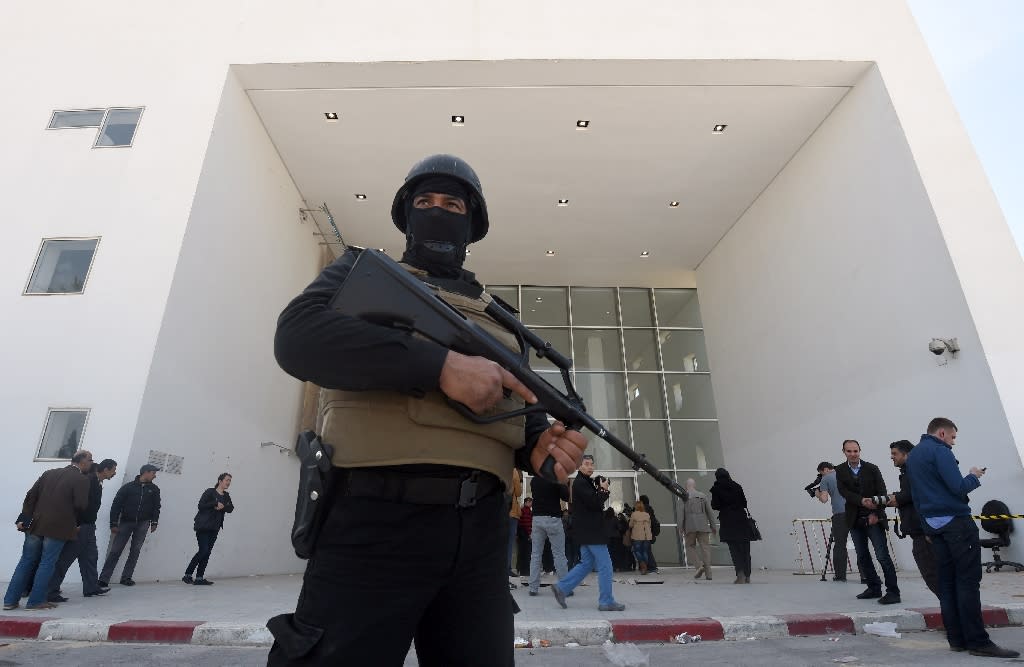Tunisia's Arab Spring Leaking
"I want the people of Tunisia to understand firstly and lastly that we are in a war with terror, and these savage minority groups will not frighten us."
"The fight against them will continue until they are exterminated."
President Beji Caid Essebsi, Tunis
"After they entered the museum, I saw their faces: They were about ten metres away from me, shooting at anything that moved."
Josep Lluis Cusido, tourist, mayor of Spanish town of Vallmoll
 |
Foreign tourists exiting a bus at the National Bardo Museum, on an onshore trip off their cruise liner were met by militants wearing military-style uniforms and with assault rifles gunning them down. After shooting eighteen of the tourists and two local Tunisians dead, the attackers charged the interior of the museum to take hostages. Eventually two of the terrorists were killed in a firefight with security forces but not before 50 innocent people were injured.
A hunt was immediately begun for the two or three accomplices who had managed to escape after the attack. The tourists who lost their lives in a country hugely dependent on its income from tourism, were from Poland, Italy, Spain, Germany and Colombia. The cruise ship, with an estimated three thousand tourists aboard, left Tunisian waters and is unlikely to return any time soon.
Islamic State Twitter accounts were rife with congratulatory messages. And urgings that Tunisians take steps to "follow their brothers" in organizing additional such attacks. The Islamic State of Iraq and al-Sham, in fact, is taking full credit for the deadly attack at the country's largest museum. Tunisia has appeared as the sole country in the North Africa/Middle East continuum to have emerged from its Arab Spring as an intact democracy.
After unseating its dictatorial ruler, Zine El Abidine Ben Ali, a country that had always looked to the West to emulate its democratic, civil style in a cosmopolitan atmosphere of tolerance, struggled to find its new place in the world of reformed democratic action. As the harbinger of the Arab Spring phenomenon that trickled through to the Middle East with disastrous outcomes, it is the only country that persevered with the outcome of freeing itself from the shackles of authoritarian rule.
The original protesters who empathized with the self-immolating despair of a fruit vendor harassed over a trade permit were affluent and sophisticated, hoping for their country to fully pattern the Western tradition of liberty and democracy and the tradition of human rights practised in Europe. The country's Islamist parties at all levels of the spectrum from moderate to fanatical made their own visions for the country's future known.
Parliament divided between secularists and Islamists, and each made an effort to get along. But radical Islamism gained the momentum to the extent that secular politicians were harassed and sometimes assassinated, calling for an end to the tolerance from radical religious parties whose aspirations represented a threat to the well-being of the country.
The slums of Tunis saw the rise of the radical Ansar al-Sharia group who saw much in common with al-Qaeda and now Islamic State, with their Libyan counterparts. Banned several years ago when the country cracked down on extremists when two leftist political leaders were killed, the government remains in a struggle to stamp it out altogether, difficult with its contiguous border with Libya now home to Islamic State militants.
Tunisian Islamists, however, have swollen the fighting force of Islamic State to an extent few other countries in the region have. Of eleven million inhabitants, Tunisia has gained the distinction of having contributed a larger number of jihadist fighters to Syria and Iraq, dedicated to the caliphate of Islamic State, than any other country in the region.
Labels: Arab Spring, Democracy, Human Rights, Islamism, Tunisia, Violence

<< Home